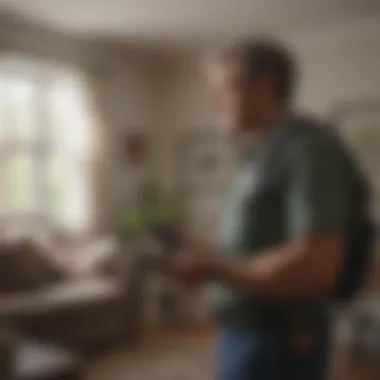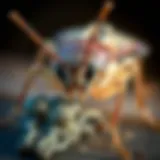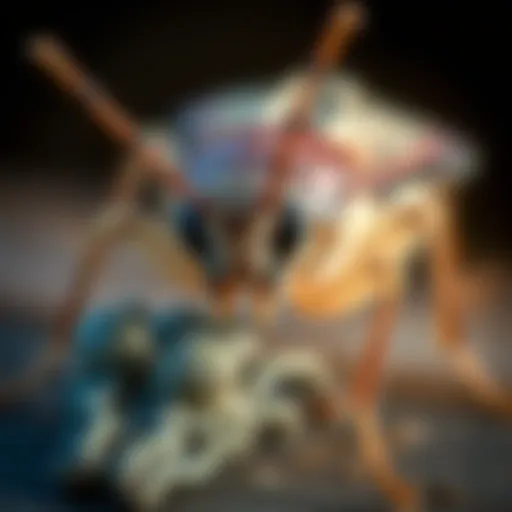Exterminator Services in Chapel Hill: A Complete Guide


Intro
Pest control is more than just a chore; it's a necessity for homeowners, especially in areas like Chapel Hill where various creatures can lurk in unexpected corners. From ants marching across the kitchen floor to mice scurrying through the attic, pests can quickly turn a peaceful home into a battleground. Understanding how to deal with these unwanted visitors is essential, and that’s where professional exterminator services come into play.
This guide aims to provide homeowners and housewives with the know-how to identify, prevent, and treat pest infestations effectively. We’ll explore common household pests, offer practical prevention strategies, and delve into the pros and cons of different treatment options. By the end of this article, a clear picture of pest management within Chapel Hill’s unique environment should emerge, arming you with the information needed to make informed decisions.
Pest Identification
Detailed Descriptions of Common Pests
Before tackling pest problems, it's crucial to know who you are dealing with. Common pests in Chapel Hill include:
- Ants: These tiny, social insects often travel in lines, scouting for food. Carpenter ants, specifically, can damage wood, while sugar ants are typically a nuisance.
- Termites: Silent destroyers, termites feed on wood, leading to extensive structural damage if not caught early.
- Bed Bugs: Small, blood-sucking insects that hide in mattresses and furniture, they can cause sleepless nights with their itchy bites.
- Rodents: Mice and rats are not only bothersome but can also carry diseases.
- Cockroaches: Resilient and hardy, these insects are often associated with unhygienic conditions and can quickly reproduce.
Signs and Symptoms of Infestations
Identifying a pest problem early can save you time, effort, and money. Here are some red flags:
- Droppings: Finding droppings around your home can signal rodents or cockroaches.
- Unusual Noises: Scratching or scurrying sounds at night may indicate mice or larger pests.
- Nesting Material: Shredded paper or fabric can mean that rodents are making themselves comfy in your home.
- Bite Marks on Food Packages: If food containers are showing signs of damage, pests may be the culprits.
Understanding these signs is pivotal; early detection plays a critical role in effective pest management.
Prevention Strategies
Home Maintenance Tips for Pest Prevention
Preventing pests starts with good housekeeping and maintenance. Here are some strategies:
- Seal Cracks and Openings: Pests often enter through small spaces. Check baseboards, windows, and doors for gaps.
- Maintain Cleanliness: Regularly cleaning surfaces, especially in kitchens, can minimize food sources for pests.
- Properly Store Food: Keep food in sealed containers to deter pests from raiding your pantry.
- Manage Yard Waste: Woodpiles and debris in the yard can attract pests. Maintain a tidy yard, and make sure to dispose of waste routinely.
Natural Deterrents and Barriers
In some cases, natural methods can keep pests at bay:
- Essential Oils: Peppermint, tea tree, and eucalyptus oils can deter many insects when diluted and sprayed around the home.
- Diatomaceous Earth: This natural powder can kill pests by causing damage to their exoskeletons without using chemicals.
- Garlic and Cayenne Pepper: A homemade spray using garlic and cayenne can repel insects when mixed with water and sprayed around entry points.
Treatment Options
Overview of Chemical vs. Natural Treatments
When prevention fails, treatment becomes necessary. Two primary approaches exist:
- Chemical Treatments: Typically more aggressive and effective, these can eradicate pests quickly. However, they may pose health risks to humans and pets if not used cautiously.
- Natural Treatments: These are generally safer for the environment but may require more time and repeated applications to achieve the same results.
Step-by-Step Guides for DIY Treatments
For hands-on homeowners, here’s a basic guide:
- Identify the Pest: Knowing what you’re dealing with determines the best treatment.
- Choose a Treatment Method: Select between a chemical pesticide or a natural alternative, based on your comfort level.
- Apply Cautiously: Follow the manufacturer's instructions carefully if using chemical treatments. For natural methods, include preparation steps and mixing ratios.
- Monitor the Situation: Keep an eye on the treated areas for any signs of returning pests.
- Seek Professional Help if Necessary: If the problem persists, it's wise to call in the experts.
In the battle against pests, knowledge is your best weapon. By understanding how to identify, prevent, and treat infestations, you can protect your home and ensure a pest-free environment.
Understanding Pest Control in Chapel Hill
Pest control in Chapel Hill isn't just about dealing with nuisance critters; it’s a vital part of maintaining a healthy living environment. This town, like many others, sees its fair share of unwanted guests, and understanding pest control enables homeowners to safeguard their properties. Our homes are sanctuaries where we spend time with family and find comfort. When pests invade that space, they not only disrupt our peace but can also pose health risks and lead to property damage.
Considering the unique climate and ecological makeup of Chapel Hill, it becomes even more crucial to grasp the common pest challenges and effective extermination methods available. By delving into the specifics of pest behavior, homeowners can be better equipped to prevent infestations or address them promptly should they arise.
The Importance of Exterminators
Professional exterminators are the first line of defense against pest infestations. Their expertise extends far beyond merely applying chemical treatments. These professionals are trained to understand pest behavior and lifecycle, which allows them to identify the root causes of infestations and take appropriate measures. When experts are involved, not only can they tackle current issues, but they can help devise strategies to prevent future occurrences. This helps homeowners save time and money in the long run, as effective treatments can diminish the likelihood of recurring problems.
Common Pest Problems in Chapel Hill
Understanding what pests commonly trouble Chapel Hill residents can aid in early detection and prompt action. Here’s a closer look at some of the prevalent pests in the area:
Termites
Termites are silent destroyers. They feast on wood, meaning they can cause significant structural damage to homes if left unchecked. One key characteristic of termites is their colony structure, which allows them to work tirelessly and efficiently. In Chapel Hill, where many homes feature wooden frames and decks, the risk of termite infestations looms large. The unique feature of termites is their ability to consume cellulose, which is found in wood and plant materials, leading to potential costly repairs if infestations escalate.
Rodents
Rodents, particularly mice and rats, are not strangers to Chapel Hill homes. Known for their adaptability, these pests can find ways into the smallest of spaces. They carry diseases and can cause property damage by gnawing through electrical wires or insulation. The key characteristic of rodents is their rapid reproduction rate – a pair of mice can lead to an infestation in no time. While they might seem harmless on their own, even a single rodent in the house can signal problematic conditions. Their unique position in the ecosystem means they often seek shelter in human habitats, which is a disadvantage for homeowners trying to maintain a pest-free environment.


Ants
Ants can invade any home, often in the quest for food or water. Their presence signals a concern, as certain species can be more destructive, like carpenter ants, which tunnel through wood. A benefit of understanding ant behavior is their communication method; they leave pheromone trails that others follow. This characteristic can help in identifying where the colony might be located. However, finding a solution can be tricky since over 700 species of ants exist in the United States, with different treatments required for each type.
Bed Bugs
Bed bugs are another significant concern. They hitch rides in luggage, bedding, or furniture, making them easy to spread. Their bites can cause discomfort and sleepless nights, leading to immense stress for homeowners. One of the key characteristics of bed bugs is their ability to reproduce swiftly and live for several months without feeding. This unique adaptability makes bed bugs especially difficult to eradicate. By the time signs of infestation appear, it may already be too late.
Spiders
While many folks may fear spiders, it's important to note their role in controlling pest populations. However, certain species, such as black widows or brown recluse spiders, can pose health risks. The key consideration with spiders is their web-building behavior; they can indicate the presence of other pests and, thus, a larger infestation. Understanding their specific traits and habits is crucial for homeowners, as it helps in determining whether the spiders are harmless or potentially dangerous.
Types of Extermination Services Available
Understanding the various types of extermination services is crucial for any homeowner or business in Chapel Hill facing pest issues. Each method has its unique advantages and situational benefits, which can greatly influence the effectiveness of pest management. Choosing the right service is not just about eradicating pests but also about ensuring a long-term solution that suits your specific needs and circumstances.
Residential Extermination Services
Residential extermination services focus on addressing pest problems in homes. These services often begin with a comprehensive inspection to identify the types of pests and the extent of the infestation. Homeowners will benefit from tailored solutions that are safe for families and pets.
Some critical aspects of residential services include:
- Customized Treatment Plans: Each home is different, and a customized treatment plan can address the specific challenges an individual home faces. For example, while one house might struggle with termites, another might have issues with ants or rodents.
- Ongoing Maintenance: Many exterminators offer year-round services. This preventive approach minimizes the chances of pests returning, saving homeowners money in the long run.
- Guidance for Homeowners: Exterminators can provide valuable advice on how to keep homes pest-free, from simple housekeeping tips to necessary repairs that close off entry points for critters.
Commercial Pest Control Solutions
Commercial pest control solutions are tailored to the specific needs of businesses, understanding that the presence of pests can jeopardize a company's reputation and operational integrity. Different establishments, like restaurants, offices, or warehouses, face unique challenges, and extermination services must be suited to those environments.
Considerations for commercial pest control include:
- Compliance with Health Regulations: Certain industries must adhere to strict health regulations. Exterminators familiar with these laws can ensure that treatment methods meet legal standards, protecting businesses from hefty fines.
- Discreet Services: Because businesses cannot afford to disrupt operations or inconvenience customers, many companies prefer exterminators who work during off-hours to minimize disruptions.
- Integrated Pest Management: Many commercial services integrate various methods, offering a longer-lasting solution that combines inspection, prevention, and treatment.
Emergency Pest Response Options
When pests invade, often unexpectedly, emergency pest response services provide immediate assistance. This is especially critical for situations where rapid action is necessary, such as in cases of a bedbug infestation or when a rodent has invaded commercial premises.
The significance of emergency services can be emphasized through:
- Rapid Response Times: These services promise quick action, often able to send a team on-site the same day issues are discovered. This is crucial for minimizing damage and disrupting pests’ mating cycles.
- Comprehensive Action Plans: Emergency responses are not just about elimination; they often include thorough assessments to prevent future infestations. This forward-thinking strategy enhances preparedness for possible future issues.
- 24/7 Availability: Many companies that offer emergency services provide round-the-clock availability, ensuring that help is just a call away, no matter the hour.
"Understanding the nuances of pest management options ensures that you are not just a reactive homeowner but a proactive one, and that can save time and money in the long run."
Identifying Pest Infestations
Identifying pest infestations is like finding a needle in a haystack, yet it’s fundamental to effective pest management. Early detection can save homeowners not just money, but also time and hassle down the road. Left unchecked, pests can spiral out of control, wreaking havoc on your home and potential health hazards for your family.
Signs of Common Pests
Each type of pest leaves behind a clue or two, and recognizing these signs is paramount. Here are the tell-tale indicators that could mean an unwanted guest has made itself at home:
- Droppings: These little pellets often resemble grains of rice for rodents, while cockroaches produce tiny dark caps. The location of these droppings can also help identify the type of pest.
- Nesting Materials: Look for bits of shredded paper, insulation, and fabric. Rodents are notorious for collecting items to line their nests.
- Chew Marks: Evidence of nibbling or gnawing can often be spotted on furniture, wiring, or food containers.
- Unusual Sounds: Muffled scratching and scuttling noises in the walls or ceilings during the night can indicate rodents on the move.
- Skin Shedding: Bed bugs leave behind exoskeletons as they grow, which can be found in the folds of bedding or on upholstered furniture.
Notice any of these signs? Time to act swiftly!
Visual Inspections vs. Professional Assessments
When it comes to pest control, not all inspections are created equal. Homeowners often wonder whether they can handle the inspection themselves or if it’s best to call in the pros. Let's break it down.
- Visual Inspections by Homeowners:
A visual inspection by a homeowner involves a thorough sweep of the house, checking for visible signs of pests. This method seems cost-effective but could miss subtle indicators, especially if you’re untrained in pest behavior. Inexperienced eyes might overlook an area under the sink or behind the refrigerator. - Professional Assessments:
Professional exterminators bring expertise to the table. They know where to look and what to look for. They conduct detailed inspections that are often more comprehensive than a simple visual check.
"Investing in a professional inspection can pay off, helping to pinpoint infestations before they escalate into full-blown problems."
Overall, while visual inspections can give you a starting point, a professional assessment can provide peace of mind and ensure that every nook and cranny is checked. Balancing the two methods can lead to the most effective pest resolution strategy.
Understanding these differences is crucial for making informed decisions as a homeowner. Identifying pest infestations correctly sets the stage for effective control measures, allowing you to protect your home and family from a lurking pest crisis.
Treatment Options Offered by Exterminators
When it comes to tackling pest problems, understanding the treatment options provided by exterminators is critical for homeowners in Chapel Hill. These treatments not only effectively mitigate infestations but also ensure that the methods used are safe for both residents and the environment. Many factors come into play when considering treatment options, such as the nature of the pest problem, the size of the infestation, the living situation, and personal preferences (like a preference for eco-friendly solutions). This comprehensive overview will delve into the two main categories of pest control: chemical treatments and natural methods.
Chemical Treatments
Chemical treatments are often the go-to solution for many exterminators. They are powerful and can deliver fast results, making them a popular choice for severe infestations. However, it's essential to understand that not all chemical solutions are the same, and their application varies.
Types of Chemicals Used


Pesticides comprise various categories, such as insecticides, rodenticides, and fungicides. Each category targets specific pests. For instance, insecticides can be designed for dealing with ants, roaches, and bed bugs, while rodenticides effectively manage rodent populations. A benefit of chemical treatments is their potency; they uniquely disrupt pest biology and behavior, promoting immediate impact. However, there's a double-edged sword with these treatments. The unique nature of these chemicals can also raise concerns about their effects on humans and pets.
Application Techniques
Application techniques of chemical treatments are crucial. Some methods involve spraying, while others depend on baiting or trapping systems. Professionals often customize the application method based on the severity of the infestation and the specific chemicals used. A significant benefit here is that exterminators are trained to administer these chemicals appropriately, minimizing the risk of over-application or mismanagement. One of the unique features of these techniques is that while they can offer quick results, they may require a secondary application for maintenance.
Safety Precautions
Safety measures are at the forefront when discussing chemical treatments. Exterminators must adhere to state and federal regulations concerning the safety of both the homeowner and the ecosystem. Precautions typically include using personal protective equipment and ensuring that pets and children are at a safe distance during application. The effectiveness of chemical treatments is undeniable, but the responsible use of chemicals is paramount to avoid potential health risks and environmental damage.
Natural Pest Control Methods
For those who prefer eco-friendly solutions, natural pest control methods present viable alternatives. These methods often emphasize using non-toxic substances that can effectively deter pests without harsh chemicals.
Organic Solutions
Organic pest control solutions include products like diatomaceous earth or neem oil. The unique characteristic of organic solutions is that they tend to be biodegradable and less harmful, promoting a safer environment. Homeowners often gravitate toward these options due to their lesser impact on the ecosystem. However, it should be noted that these solutions may take longer to show results compared to their chemical counterparts. Understanding the balance between effectiveness and safety is key here.
Essential Oils and Their Uses
Using essential oils as pest deterrents is increasingly in vogue. Scents like peppermint or tea tree oil can repel insects effectively. The benefit of essential oils is that they are safe for humans and pets, making them attractive for many homeowners. These oils can also bring a pleasant aroma into living spaces. However, one should keep in mind that while essential oils are natural, they still require proper application and may not offer the same rapid results as chemical solutions.
Integrated Pest Management (IPM)
Integrated Pest Management (IPM) represents a holistic approach. IPM combines several methods, typically incorporating biological, cultural, and chemical strategies. This method aims to manage pest populations at manageable levels while minimizing risks to people and the environment. A vital characteristic of IPM is its emphasis on understanding pest lifecycles. By targeting pests more strategically, it can be a more sustainable choice in the long run. However, implementing an IPM strategy may require more time and careful planning compared to straightforward chemical treatments.
In summary, understanding the diverse treatment options available, ranging from traditional chemical methods to modern natural practices, is essential for homeowners in Chapel Hill. Each approach possesses unique characteristics, benefits, and considerations. Ultimately, the decision will hinge on individual needs, pest issues, and a desire for safety and sustainability.
Selecting the Right Exterminator
Choosing the proper exterminator is a critical step in pest management. The right professional can make all the difference when it comes to effectively addressing infestations in your home. Selecting an exterminator goes beyond just looking for a service; it’s about finding someone who will treat your concerns with the seriousness they deserve. This process involves thoroughly assessing credentials, understanding customer feedback, and keeping an eye on costs.
Evaluating Credentials and Certifications
When it comes to selecting an exterminator, credentials matter. It’s not enough to simply pick someone from a search engine and hope for the best. You need to ensure that the exterminators you consider are licensed and certified. In North Carolina, for example, pest control professionals must meet specific state regulations and obtain appropriate licenses. Check that they hold certifications related to the service they provide, such as fumigation or chemical application.
Moreover, many states have ongoing training requirements for pest control professionals. This means they stay updated on the latest technologies and methods in pest management, which is beneficial for you. Asking for proof of these credentials might feel a bit much, but it’s your peace of mind at stake.
Customer Reviews and Recommendations
Don’t underestimate the power of grassroots knowledge—customer reviews can say a lot about an extermination service. Referral from friends or family can lead you to trustworthy professionals. Online review platforms, such as Facebook or Reddit, also offer valuable insights.
Look for patterns in the feedback. Are people consistently praising prompt service? Or are there complaints about hidden fees? A review that commends the thoroughness of the service might speak volumes over detailed descriptions of pest encounters. Ultimately, good reviews can highlight a dependable exterminator who respects their clients’ homes.
Cost Considerations
Understanding Pricing Structures
When you get quotes from various extermination services, it's critical to comprehend the pricing structures. Some companies may charge a flat fee for an initial inspection and additional costs for treatments. Others might offer packages that bundle different services together. A transparent pricing structure not only helps you understand what you’re paying for but also allows you to avoid surprise bills down the line.
For example, some might charge lower upfront costs but come with a bait-and-switch strategy that leads to higher overall expenses later on. Knowing how a pest control company structures their fees is vital in making an informed choice.
Evaluating Cost vs. Value
Cost shouldn’t be the only consideration when selecting an exterminator. It's essential to weigh the cost against the value of the service provided. A cheaper option may seem appealing initially, but if it lacks thoroughness or effectiveness, it could leave you with ongoing pest issues, leading to greater expenses down the line. Take a moment to evaluate what you’re getting for your money.
For instance, an exterminator who provides ongoing inspections and preventative measures might be priced higher but saves you potential headaches later. Consider not just the financial aspect but how the services align with your pest control needs. In the end, the cost versus value equation aims at ensuring you invest wisely in a professional capable of safeguarding your home.
Remember, the cheapest choice can sometimes be the most expensive in the long run. Choose wisely and weigh all factors.
Preventive Measures to Discourage Infestations
Keeping pests at bay is crucial to maintaining a comfortable home. Preventative measures play a vital role in pest control, offering a proactive instead of reactive approach. By integrating consistent maintenance and home improvement practices, homeowners can significantly reduce the chances of unwelcome critters making their residence their own.
Regular Maintenance Practices
Regular maintenance isn’t just about keeping things tidy; it’s about creating an environment that simply isn’t inviting for pests. When pests see clutter, they see opportunities. Thus, consistent cleaning and inspections can go a long way. Here are some specific practices to consider:
- Routine Cleaning: Regular sweeping and vacuuming eliminate food sources.
- Monthly Inspections: Check for signs of pests, such as droppings or nests, regularly around your home, particularly in hidden spaces like attics and basements.
- Gutter Maintenance: Keep gutters free of debris to avoid making your home a nesting place for insects.
Home Improvement Tips for Pest Prevention
Home improvement can make a significant difference in deterring pests. Here’s how a few straightforward tweaks can bolster your defenses:
Sealing Entry Points


Keeping pests out starts with understanding how they get in. Sealing entry points is essential. This means identifying gaps, cracks, and holes around doors, windows, pipes, and vents.
- Key Characteristics: It not only blocks pests but also makes your home more energy-efficient. Why is it popular? It’s a straightforward solution that requires minimal effort but yields great results. The unique aspect? You can often complete it yourself without extensive renovations.
- Advantages: It reduces pest entry, lowers energy costs, and helps stop moisture buildup that can lead to mold.
- Disadvantages: It can require ongoing evaluations since small gaps can open over time.
Landscaping Considerations
The way your yard is designed matters more than many may think. Landscaping can either invite or repel pests. Implementing certain strategies keeps pests from thinking your yard is their new playground.
- Key Characteristics: Choosing low-maintenance plants reduces the need for pesticides, therefore minimizing risk to beneficial insects. It's a popular choice as it promotes a pet-friendly environment.
- Unique Features: Creating barriers with gravel or mulch can deter nesting and breeding.
- Advantages: It beautifies your property while serving as a defensive line against pests.
- Disadvantages: Some landscaping choices may invite new pests if not done cautiously.
Proper Waste Management
Control starts with how waste is managed around your home. Proper waste management is crucial for pest prevention. It relates to encouraging good practices in and around your home.
- Key Characteristics: Regularly disposing of garbage minimizes the attraction of pests looking for food. Why it’s beneficial? It reduces the food sources available to pests, effectively dryin’ them out.
- Unique Features: Using sealed containers can prevent pests from accessing waste, while keeping your outdoor space clean.
- Advantages: Lessened chances of infestations, reduction in unpleasant odors, and it helps keep your home looking neat.
- Disadvantages: It does take some diligence to be consistent in waste management practices.
"An ounce of prevention is worth a pound of cure."
Taking preventative measures in Chapel Hill not only aids in keeping pests at bay but also creates a more enjoyable living environment. This approach not only saves time and costs associated with pest control down the line but also fosters a healthier home. Integrating these measures is a step toward ensuring your household remains a pest-free zone.
Legal and Ethical Considerations
Navigating the labyrinth of pest control requires not just expertise in extermination methods, but also a solid understanding of legal and ethical considerations. This segment addresses why these elements are crucial for both exterminators and homeowners in Chapel Hill. Legal frameworks surrounding pest control can govern how pest management companies operate, ensuring they adhere to certain standards that safeguard public health and environmental integrity.
Being informed about these laws helps homeowners make autonomous choices regarding pest management, thereby ensuring they do not inadvertently engage in practices that could violate local regulations. Similarly, understanding legalities allows exterminators to operate responsibly, striking a balance between effectively managing pest infestations and adhering to state laws.
Understanding Pest Control Laws in North Carolina
In North Carolina, pest control is heavily regulated. Various laws dictate how exterminators should conduct their business and deal with chemical applications. For instance, certain pesticides are classified under strict guidelines, limiting their use to licensed professionals only. This regulatory framework aims to protect both the environment and public health.
Homeowners should be aware of the following:
- Licensing Requirements: Only licensed applicators can use restricted pesticides. It’s imperative to verify an exterminator's credentials before allowing any pesticide treatment.
- Notification and Reporting: In many cases, homeowners must be notified prior to pesticide application. Exterminators have a duty to inform their clients about the chemicals being used and any associated risks.
- Integrated Pest Management (IPM): The state encourages a holistic approach to pest control that minimizes chemical use while promoting environmental stewardship. IPM strategies take into account the life cycles of pests, their natural predators, and local ecology.
Familiarizing oneself with these stipulations adds a layer of assurance, protecting you as a homeowner and fostering responsible pest control practices among professionals.
The Ethical Treatment of Pests
The ethical treatment of pests extends beyond mere extermination. It raises questions about how we view these creatures that often invade our spaces. While pests can be troublesome, understanding their ecological roles can prompt more humane approaches to pest management. Exterminators are increasingly being called to navigate these ethical complexities, and here's why that matters:
- Humane Solutions: Many modern extermination services prioritize humane traps and exclusion practices, choosing to relocate creatures rather than eliminate them whenever possible. This can be especially true for species such as raccoons or squirrels, which may pose challenges but are also integral parts of the local ecosystem.
- Environmental Impact: The overuse of chemicals can harm beneficial insects, soil health, and water quality. Ethical pest control advocates for methods that minimize environmental damage, such as using plant-based pesticides or fostering natural predator populations.
- Community Awareness: Exterminators are positioned to educate homeowners on the behaviors of pests and preventative measures, fostering coexistence rather than conflict. By promoting awareness of pest life cycles and habitats, the community can be better equipped to manage infestations ethically.
"When dealing with pests, the key is to remember we share this environment with them. Responsible pest management reflects our understanding and care for both human and animal welfare."
Case Studies and Success Stories
Understanding the impact of extermination services in Chapel Hill comprehensively involves examining real-life experiences. Case studies and success stories are vital. They illustrate the practical applications of pest management strategies and shed light on effective methodologies employed by exterminators. These narratives are not just tales of triumph; they provide insight into challenges faced during pest control operations, the decisions made by professionals, and the satisfaction of clients who seek relief from infestations.
Learning from others' experiences can offer a blueprint for homeowners. Individuals can recognize the significance of choosing the right exterminator and the range of solutions available to combat pest problems. Moreover, such case studies can show the immediate and long-term benefits of professional intervention in pest control.
Residential Treatment Success
In one Chapel Hill neighborhood, a family discovered a severe termite infestation threatening their home’s foundation. After reaching out to a local exterminator, a thorough inspection was conducted. The exterminator used advanced chemical treatments combined with baiting systems to eradicate the termites effectively.
The process took several days, during which the family received regular updates and guidance on how to prepare their home for treatment. The results were striking. Within weeks, the infestation was under control, and the family could rest easy knowing their home was safe. Beyond just eliminating the termites, the exterminator provided preventive measures, such as suggestions for repairing leaks and sealing cracks, which helped mitigate future risks. This experience highlighted that timely interventions and professional guidance can preserve a home's integrity.
Commercial Pest Management Achievements
In the busy landscape of downtown Chapel Hill, a restaurant struggled with a persistent rodent issue that jeopardized its reputation. The owner sought the expertise of a renowned pest control company specializing in commercial environments.
The exterminators implemented a comprehensive pest management program that included trapping, sanitation improvements, and structural repairs to eliminate entry points for rodents. They also trained the restaurant staff on proper waste management and maintenance practices to avoid attracting pests in the future. As a result, within a short span of time, not only were the rodents eliminated, but the restaurant saw an increase in customer satisfaction and a positive lift in online reviews.
This case undoubtedly underscores the importance of tailored pest management strategies and the proactive measures necessary in commercial settings. A well-executed extermination plan can significantly help businesses maintain a favorable image, ensuring that the attention remains on excellent service and food quality, rather than pest problems.
Case studies reveal how targeted pest management works in real scenarios, enriching both residential and commercial pest control practices.
By reflecting on these success stories, homeowners and business owners alike can appreciate the value of professional extermination services in Chapel Hill. They show the potential for positive outcomes when the right steps are taken at the first signs of a pest problem.
End and Future Outlook
In the intricate realm of pest management, understanding the conclusion and future outlook of extermination services is paramount for residents of Chapel Hill. With a blend of knowledge and practical application, homeowners and property managers can anticipate shifts in pest control methods, ensuring they stay ahead of potential infestations.
Evolving Pest Control Techniques
As we delve deeper into the future of pest control, it’s evident that technology plays a critical role. Innovations such as smart traps and automated pest detection systems are changing the landscape. These advancements allow exterminators to respond more efficiently to infestations, often before they escalate into significant issues. Moreover, the shift towards eco-friendly solutions is not just a passing trend. Many exterminators now incorporate integrated pest management (IPM) approaches that prioritize sustainability and safety. This means that techniques are becoming less reliant on harsh chemicals, leaning instead on biological controls and preventative methods. Homeowners can expect a more holistic approach that harmonizes with their environment, reducing the necessity for invasive treatments.
"Embracing new techniques in pest control can contribute to a healthier home and community environment."
Community Involvement in Pest Control Solutions
The success of pest management is not solely dependent on professionals; community engagement is crucial. Local residents can protect their homes by adopting preventative practices and sharing knowledge within neighborhoods. Informative workshops led by exterminators can empower individuals, teaching them how to identify early signs of infestations. Moreover, platforms like community forums on Reddit or Facebook are vital as they allow homeowners to exchange experiences and solutions. By working together, the community can foster a shared responsibility towards pest control initiatives, enhancing public awareness.



